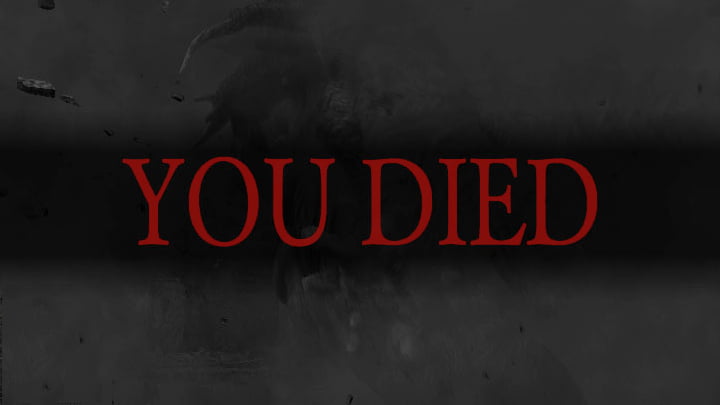Why do we put difficult games on a pedestal? Perhaps it is risk, reward, and potential for loss – not the difficulty itself – that makes it exhilarating.
Have you ever luxuriated in a hangover? I’ve fond memories of sitting in Wetherspoon’s, gently cradling my lolling head, feeling the soft humming of a headache. Staring down into my draft coke, I’d feel pangs of dull pain shoot up and down my limbs. It’s never quite about the present moment in a hangover; it’s about being softly absent. There’s an element of pleasure in it: of appreciating the night before, of feeling sorry for yourself – the aches and pains are like signs of a job well done.
I had a similar feeling playing Bloodborne. I was trudging through the snowy wastes outside Castle Cainhurst, doggedly marching back to my date with Martyr Logarius. You see, I love Bloodborne for lots of reasons, but one of my few criticisms of the game was this: the lengthy loading screens and the backtracking are just a little too punitive a punishment for a game that’s built around you dying. My attitude was something along the lines of, ‘well if I’m supposed to die to get better and to learn, then surely that should be embraced and not punished?’
Not quite so. As I reached the lift that would take me up to the castle’s battlements, I caught myself with the same languorous smirk on my face. That loading screen made my head lull downwards, crestfallen, I let out a long, achy sigh. When I was up on that roof I knew this is what I’d get if I failed. Would I change it? Of course I wouldn’t – that’s what made the fight so thrilling. I was truly alive in those moments; there was a lot at stake, and not just blood echoes – the game’s currency – but the pain of backtracking and waiting. These loading screens, which at first seemed insult lumped on injury, were now signifiers of something that was truly felt – they were my hangover.
People talk about difficult games being more rewarding, and they can be. Some talk about them being better overall experiences – maybe so. But it isn’t the difficulty that enhances a game’s ability to really capture us; It’s what we risk, what we bet, what we leave on the table. In this case it was something like 37,000 fucking blood echoes. I know what you’re thinking – was it a bit careless of me to carry it around? – well, think of me as a high roller. See, I’ve always thought gambling is at the heart of gripping gaming experiences, and the reason for this is that we need failure to actually mean something. This doesn’t mean we need towering difficulty, just a little weight on our backs.
It’s always worth remembering that the Resident Evil games were considered difficult in their day. Before players really understood what survival horror meant, they would instinctively shoot everything that moved, run into danger, use up all their herbs, and end up riddled with bite marks. Really, it wasn’t the height of the challenge in front of people that gave these games their breathless immediacy; in fact, when you understand them, they aren’t all that tough.

Resident Evil, through its charming save system – wherein you’d levy your available ink ribbons to save as best you could, never knowing what was up ahead – infused the game with the thrill of the gamble. Spotting something truly awful at the end of the corridor conjured the same sense of suspension as when you’re staring into the swirling vortex of a roulette wheel. The room around you fades to black and time drips like syrup off a spoon. Playing those old Resident Evil games was like dancing on a knife edge. Every advancing minute since your last save upped the ante. This made reaching every save room feel like triumphantly shouting BANK on The Weakest Link, and breathing a sigh of relief as Anne Robinson (read: an utterly furious zombie) scowls at you from the other side of the divide.
A long while back this notion was built into games in a very literal sense with the arcade. Once a hallowed proving ground, spotting an arcade cabinet now is like seeing the rib cage of some ancient beast jutting out from the dust. It used to be the creamy centre of the gaming crop. The hardware in the cabinets meant graphics beyond compare, but better still: the money you crammed into the slot was at once the price of admission and a bet. And anyone that’s scrabbled to keep their guard up against Dhalsim’s long lashing limbs while running on two pixel-rows of juice can attest to the world melting away, of being held in thrall in a way that doesn’t quite happen when you can press to continue without cost.
The thing about difficult games is that you seek the rewards that come from beating a steep challenge. We’re not talking in-game rewards; we’re talking about the cascading frisson of dopamine that explodes in your brain. In Daniel’s review of The Witness he describes this feeling vividly: “The urge to solve every puzzle in The Witness doesn’t just come from a desire to see what comes next, it comes from the desire to beat him. Or at least to prove that you are his equal.” He is talking there about wanting to beat the game’s designer, Jonathan Blow, but he’s also chasing that chemical rush that washes over you in an awesome wave when you figure out a tough puzzle.
In an article from the Florida Atlantic University Press, Science Editor Andrew Fraieli talks about the way our brains are wired, saying, “Human brains are goal and accomplishment orientated. A person has an intent to do something, he/she succeeds, and subsequently gets a shot of dopamine.”
Professor of Psychology at FAU, Elan Barrenholtz likened video games to drugs, in that they are: “Similar to drugs, because it can create an artificial reward feedback loop.”
If you look at games like Hotline Miami and Super Meat Boy, games that suffuse steep challenge with the power to restart in a split-second upon failure, you can feel the weightlessness. The gameplay loop of these furious, sweaty-palmed challenges resembles a lying bastard’s polygraph test: with each sharp downfall you spike straight back up again, over and over, chasing that reward.

I should say that these games wouldn’t work any other way; they rely on speed, recklessness, and repetition to euphoric effect. It’s just that in the hazy neon motion-blur of a Hotline Miami rampage, I feel a sort of dreamy disconnect with what’s happening, which stands in stark contrast to my fight with Martyr Logarius back there. During that fight, my mind was saddled not with what was next, or who I wanted to beat, but instead was simply … there, on the roof of the castle. Nothing else mattered.
I should also say that difficulty is still important: it does help if there’s a good chance we’ll actually get to the game over screen for all this to mean anything. It’s just not enough on its own. Play is vivid when there are consequences that make us ache. Though we’ll groan and grumble in our hangovers, it’s the very act of saying ‘fuck it’ and accepting what comes after that makes what’s right in front of us so sweet.
What was it that John Lennon said? Play is what happens when you’re busy staring at the next high score … something like that anyway, and he would know – apparently he was well into Geometry Wars.






